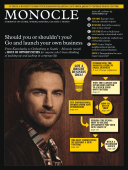
Issue 28
From Kamchatka to Gothenburg to Seattle – Monocle reveals a host of opportunities for anyone who’s been thinking of packing up and jacking in corporate life.
In This Issue
Oops! No content was found.
Looks like we no longer have content for the page you're on. Perhaps try a search?
Return Home

